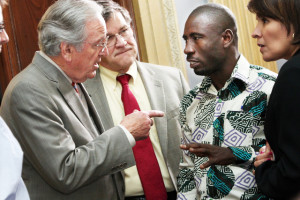
By: Elizabeth Clapp
On Tuesday, April 8, a Congressional Briefing was held on Capitol Hill, entitled “Combating Exploitative Child Labor.” In attendance was Senator Tom Harkin, along with a panel of activists and professionals working within the anti-child labor trafficking movement. These individuals are on the front lines, helping young children who have been exploited by working in harsh conditions for the profit of others. David Abramowitz of Humanity United noted that child labor is “morally, physically, [and] socially harmful,” and that it keeps children from gaining opportunities such as education. One of the focuses of the briefing was on the exploitative roots of the industries that feed off of child labor trafficking.
A primary way that children end up working in these dangerous conditions is through the economic vulnerability of their families. Shauna Bader-Blau of Solidarity Center observed that in Liberia’s rubber plantations, if parents are given more than they can handle in workload, they will often recruit their families to help them fill the quota in order to pay the bills. Another way in which children end up in exploitative labor is if their families cannot afford to put them into school. As Ms. Bader-Blau confirmed, in the Democratic Republic of the Congo (DRC) there are often school entrance fees that families cannot pay. Therefore, their children may join the tens of thousands of other kids working in the DRC’s cobalt and copper mines. The promising futures of children are stolen because the economic tables are turned against them and their families.
Shared Hope International acknowledges that economic vulnerability can be a factor that leads to exploitation, whether that comes in the form of labor or sex trafficking. That is why we partner with organizations worldwide to fight the epidemic of exploitation, focusing on sex trafficking. One of our partners is Asha Nepal, an organization that provides Nepalese trafficking survivors a welcoming home. These women are often lured by the prospect of a better job – only to become trapped in the sex industry. By offering education and job skills training programs, we work to encourage financial stability and independence.
Learn more here about Asha Nepal and the stories of Nepalese trafficking survivors.
We also partner with Sparsh, an organization based in India that provides a sanctuary for survivors of sex trafficking in India’s brothels and their children, as well as the children of the mothers still trapped in the brothels. One mother recalls she had worked long hours in a factory and heard about a job with higher wages. What she didn’t realize is that the new job required her to sell her body, health and dignity for hours each day in an Indian brothel. Economic disincentives such as these steal opportunities for a better life and drive people of any age into the exploitative sex trafficking and labor trafficking industries.
Learn more here about Sparsh and the stories of women escaping from India’s brothels.






